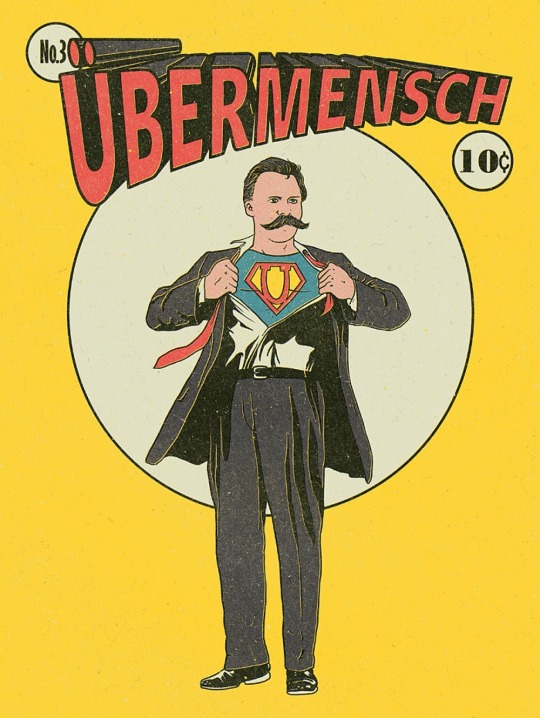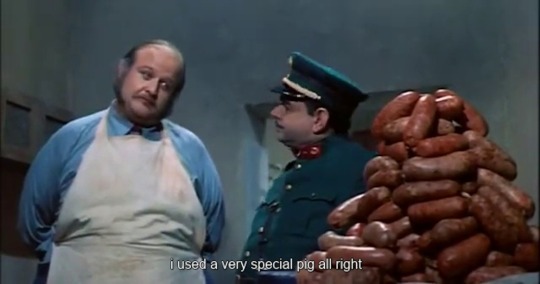#Übermensch
Explore tagged Tumblr posts
Text
KWON JIYONG!!!!!!!!
youtube
10 notes
·
View notes
Text

They muddy the water, to make it seem deep
#friedrich nietzsche#nietzche#quote of the day#quotes#book quotes#aphorisms#philosophy#good is dead#nihilism#Übermensch#eternal return#dyonisus#free will#thus spoke zarathustra#existentialism#dread#wagner#the antichrist#too deep#muddy the water#Human#All Too Human#They muddy the water#to make it seem deep
8 notes
·
View notes
Text

Friedrich Nietzsche, Übermensch
20 notes
·
View notes
Text
youtube
6 notes
·
View notes
Text

Trump is personally a pile of orange flab with hilariously bad hair. Yet some of his fervent followers depict him incongruously as a "god-emperor".
Hitler had one testicle and a problem with flatulence. But he was held up as the ideal of Übermensch manhood by Nazis.
Fascists are highly patriarchal and misogynistic. So they feel a need to have leaders who exude stereotypical and toxic male behavior. And if those leaders don't quite fit the bill there are always fan art and mythological narratives. And when reality interferes with those narratives it is condemned as "fake news".
Hype is present in any campaign – that's politics. But it's a warning sign when a candidate is depicted as superhuman or being perfect despite very obvious flaws.
#fascism#fascist mythology#donald trump#the trump cult#god-emperor#maga#republicans#adolph hitler#nazis#übermensch#patriarchy#toxic masculinity#election 2024
8 notes
·
View notes
Text
Friedrich Nietzsche: The Price of Unyielding Truth
Friedrich Nietzsche’s quest for truth led him to profound philosophical revelations, yet his intellectual isolation became a source of personal turmoil. The Relentless Pursuit of Philosophy and Its Unseen Cost In the labyrinth of human thought, few figures stand as boldly as Friedrich Nietzsche. His insatiable hunger for truth and understanding led him down a path of profound philosophical…
#Übermensch#emotional stability#eternal recurrence#existential philosophy#Friedrich Nietzsche#human mind#intellectual isolation#intellectual pursuit#mental collapse#Nietzsche’s breakdown#philosophical journey#Philosophy#Solitude
2 notes
·
View notes
Text

“When I thought of Jeremy and his talk about 'higher men' I wanted to laugh out loud. The life of the spirit was all very well—and Bach and Delius and Schopenhauer had been an incomparable enrichment to the world—but it was never supposed to be kept separate from the life of the body. Music and philosophy were like wine—they were intended to enhance the pleasure of being alive, not to replace it: What surprised me most was that I had starved my humanity for as long as I could remember, feeding it on a diet of ideas and mathematics—and yet I had not starved it to death, for here it was, as healthy as ever, revelling in the thought of Patricia's damp hand. The truth suddenly seemed very simple; life was supposed to be many-sided, and the happiest human being is he who succeeds in perceiving as many sides as possible. I had spent my whole life living with an error—that life is supposed to be dominated by one truth; and it had worried me that life has an aspect of violence as well as of order and reason. But the truth is that life has hundreds of aspects, and every philosophy represents only one of them.
And it was at that moment that I had my great idea; I still believe it is the most important idea that has ever come to me. If I thought about it for the next fifty years, I should not become aware of all its implications.
It was this. We take it for granted that a man can adjust his intellectual viewpoint as easily as he can adjust the range on a telescope. One day he can agree with Schopenhauer that the world is a death-trap and that the most sensible thing would be suicide, and the next day agree with Dr Pangloss that everything is for the best in this best of all possible worlds. He can take any one of a thousand points of view about life, from optimism to total pessimism. He can take up a dozen books in succession, from The Fifth Form at St Dominic's to The Brothers Karamazov, and see the world through the eyes of each author. We all take these intellectual quick-change acts for granted.
Why, in that case, does man accept his emotional states as somehow unchangeable? A man gets up early in the morning in a state of nervous tension, and feels depressed at the prospect of having to live through another day. Then he goes outside; it is a spring morning and the sun comes out; immediately he feels cheerful. His emotional climate has altered in a few seconds, yet he accepts this as a kind of natural accident, like the sun coming out—something beyond his control.
Admittedly, man knows a little about altering his emotions. If he likes music, then he will play a Tchaikovsky symphony when he feels a need for romantic emotion, Chopin when he feels melancholy, Wagner when he wants heroics, and so on. But he is still submitting himself to new experiences to change his emotions; he never asks himself why he should not have as much control over his emotions as over his ideas.
When I read what I have just written, I see that I have still not conveyed my central idea. Because I am not talking about mere emotional changes—from sadness to happiness, for example. We do not spend most of our lives in states of gloom or optimism or pity or excitement; we spend them in a state of emotional constipation—feeling nothing, or very little indeed. That is why the people in our office lived in such a state of dullness. They accepted this; they waited patiently for destiny to present them with some state of happiness or excitement. It never struck them that this state of emotional constipation was thoroughly unnatural—as unnatural as physical constipation.
It seemed to me that a person should be able to wake up and say: Now, how shall I feel this morning? Shall I wear my Tchaikovsky mood? Or my Bach mood? Or perhaps my Beethoven mood?' Obviously, certain moods would be unsuitable for a morning spent adding up figures, or doing the spring cleaning, or attending a parents' meeting at the school, just as a fur coat would be the wrong garment for a summer's day. If I woke up on a cold morning and found myself wearing a swimsuit, I would not feel bound to go to work in it. And yet we feel bound to accept the mood in which we wake up in the morning—or the complete lack of mood, which is more usual.
These ideas came to me as I sat in front of the fire, reading Vinogradoff; I still have the copy of Vinogradoff with the clean pages at the end (intended for calculations) covered with my handwriting. When I had written these ideas down, I remembered that I had promised to see Gerald Sutton, so I walked over. It was a clear cold night, and I looked at the sky and thought: Man is static because he has no reason to be anything else. No one teaches him any differently. Zoologists tell us that an animal takes three times as long to learn how to behave if it has no mother. Well, man has no mother and father; he is completely alone. One god, one god-like human being, would change the course of history by showing men how to behave . . . . ” - Colin Wilson, ‘The Violent World of Hugh Greene’ (1963) [p. 133 - 135]
#wilson#colin wilson#violence#hugh greene#emotions#truth#philosophy#literature#existentialism#mishima#yukio mishima#ubermensch#übermensch#nietzsche
6 notes
·
View notes
Text
instagram
NIR ALTMAN - Übermensch,
5 notes
·
View notes
Text

If you change your perspective on everything and take a step back as a human being, you will ultimately be able to view the world of all things that surround us - the stars, the sky, the earth, the oceans - as a small part whose importance for the eternity of the whole is ultimately insignificant.
Humanity is as ephemeral as the dinosaurs and has the inability to even reach the existence time of the dinosaurs.
The planet, the sun, the solar system and everything else simply go on without us.
Only we see the whole thing and we really mean the whole thing, the habitat on which we can exist and the cosmetic coincidence that the planet protects us from the sun. Only those who have understood this will come to the realisation that we ourselves are our greatest enemy.
Our hairy ancestors the apes are territorial, basically hostile representatives of tribes that were in competition with other tribes for resources.
To this day, the legacy of our ape brains has not really evolved much if you look at the history of mankind in a value-free way.
The naked ape with the high technical understanding and the urge to explore, discover and then utilise everything and anything is not really any more morally and ethically developed than his ancestor.
Ape remains ape no matter how he dresses and what technology he uses as long as the tribal thinking with territorial behaviour does not want us to realise that we are all one tribe and have to work together to get a longer stay on this planet, it is meaningless to believe that we are civilised.
mod
A "Übermensch" is not someone who rises above people, but someone who transcends himself and his insights in order to distance himself from the world by recognising it.
mod
You will ask what is the purpose, the purpose is just pure knowledge detached from your own self. But the benefit? why put on the mass of old values with the realisation a possibility is opened up more, nothing more and yet it is everything.
Only those who recognise themselves will recognise others.

#galelry mod#freedom of expression#Übermensch#super humans#human brain#humanity#love#peaceful#universum#reality#thankful#one life to live
4 notes
·
View notes
Text
Meat is meat: THE MAD BUTCHER (Guido Zurli,1971)
Some months ago, I reviewed a film called Auntie Lee’s Meat Pies, in which I asked readers “What’s in your pie?” This film, The Mad Butcher (Lo strangolatore di Vienna), asks a far more profound question: “What’s in your sausage?” In each case, a better pronoun might have been “who”. Guido Zurli was an Italian director but this film was made in English, set in Vienna and starred the wonderful,…

View On WordPress
#Übermensch#black comedy#cannibalism#Guido Zurli#H.G. Wells#Hannibal#human flesh#innocent cannibalism#Jack the Ripper#Lo strangolatore di Vienna#meat#meat is meat#Sweeney Todd#The Mad Butcher#Victor Buono#Vienna
2 notes
·
View notes
Text
yo' choice, drop it on me

3 notes
·
View notes
Text

Abraçament simbiòtic, per SymbioteCollector. [font]
#art#art digital#art artificial#art automàtic#art robòtic#simbiont#Venom#simbiosi#millorament#übermensch#sobrehumà
1 note
·
View note
Text
youtube
#nietzsche#friedrich nietzsche#nietzschequotes#voluntad de poder#Übermensch#Dios ha muerto#Nihilismo#Youtube
0 notes
Text
"Exploring the Philosophical Depths: Friedrich Nietzsche's 'Beyond Good and Evil'"

Friedrich Nietzsche's "Beyond Good and Evil" is a philosophical tour de force that challenges conventional morality and calls into question the very foundations of Western thought. Published in 1886, this seminal work presents a radical critique of traditional ethics, religion, and metaphysics, advocating for a reevaluation of values based on individual will and self-overcoming.
At its core, "Beyond Good and Evil" is a relentless interrogation of morality and its origins. Nietzsche famously declares that "God is dead," signaling the collapse of traditional religious beliefs and the need for a new ethical framework rooted in human experience and perspective. Throughout the text, he dismantles the dichotomy between good and evil, arguing that moral judgments are subjective and contingent upon individual interpretation.
Nietzsche's prose is both incisive and provocative, filled with aphoristic insights and paradoxical statements that challenge readers to think deeply about the nature of existence. He explores a wide range of topics, from the nature of truth and knowledge to the psychology of power and domination. Through his critique of traditional values, Nietzsche seeks to liberate individuals from the constraints of herd mentality and encourage them to embrace their own unique potential.
Central to Nietzsche's philosophy is the concept of the "will to power," which he defines as the driving force behind all human behavior. He argues that individuals must strive to overcome societal norms and constraints in order to achieve self-realization and become what he calls "übermensch" or "overman." This idea of transcending conventional morality and embracing one's own instincts and desires is central to Nietzsche's vision of a liberated and creative humanity.
Throughout "Beyond Good and Evil," Nietzsche challenges readers to confront uncomfortable truths about human nature and the nature of reality itself. He exposes the hypocrisy of moral absolutism and calls for a more nuanced understanding of ethics based on individual autonomy and self-expression. While his ideas may be controversial and unsettling, they have profoundly influenced modern philosophy and continue to provoke debate and discussion to this day.
In conclusion, "Beyond Good and Evil" stands as a testament to Nietzsche's intellectual daring and visionary insight. With its bold critique of traditional morality and its call for a new era of individualism and self-assertion, the book remains a powerful and relevant work that challenges readers to question their most deeply held beliefs and assumptions about the world.
Friedrich Nietzsche's "Beyond Good and Evil" is available in Amazon in paperback 12.99$ and hardcover 19.99$ editions.
Number of pages: 227
Language: English
Rating: 10/10
Link of the book!
Review By: King's Cat
#Friedrich Nietzsche#Beyond Good and Evil#Philosophy#Morality#Ethics#Will to power#God is dead#Übermensch#Individualism#Nihilism#Truth#Knowledge#Existentialism#Perspectivism#Critique#Self-overcoming#Human nature#Psychology#Herd mentality#Transcendence#Freedom#Autonomy#Subjectivity#Objectivity#Criticism#Truth-seeking#Cultural critique#Value systems#Interpretation#Contradiction
0 notes
Text
"Exploring the Philosophical Depths: Friedrich Nietzsche's 'Beyond Good and Evil'"

Friedrich Nietzsche's "Beyond Good and Evil" is a philosophical tour de force that challenges conventional morality and calls into question the very foundations of Western thought. Published in 1886, this seminal work presents a radical critique of traditional ethics, religion, and metaphysics, advocating for a reevaluation of values based on individual will and self-overcoming.
At its core, "Beyond Good and Evil" is a relentless interrogation of morality and its origins. Nietzsche famously declares that "God is dead," signaling the collapse of traditional religious beliefs and the need for a new ethical framework rooted in human experience and perspective. Throughout the text, he dismantles the dichotomy between good and evil, arguing that moral judgments are subjective and contingent upon individual interpretation.
Nietzsche's prose is both incisive and provocative, filled with aphoristic insights and paradoxical statements that challenge readers to think deeply about the nature of existence. He explores a wide range of topics, from the nature of truth and knowledge to the psychology of power and domination. Through his critique of traditional values, Nietzsche seeks to liberate individuals from the constraints of herd mentality and encourage them to embrace their own unique potential.
Central to Nietzsche's philosophy is the concept of the "will to power," which he defines as the driving force behind all human behavior. He argues that individuals must strive to overcome societal norms and constraints in order to achieve self-realization and become what he calls "übermensch" or "overman." This idea of transcending conventional morality and embracing one's own instincts and desires is central to Nietzsche's vision of a liberated and creative humanity.
Throughout "Beyond Good and Evil," Nietzsche challenges readers to confront uncomfortable truths about human nature and the nature of reality itself. He exposes the hypocrisy of moral absolutism and calls for a more nuanced understanding of ethics based on individual autonomy and self-expression. While his ideas may be controversial and unsettling, they have profoundly influenced modern philosophy and continue to provoke debate and discussion to this day.
In conclusion, "Beyond Good and Evil" stands as a testament to Nietzsche's intellectual daring and visionary insight. With its bold critique of traditional morality and its call for a new era of individualism and self-assertion, the book remains a powerful and relevant work that challenges readers to question their most deeply held beliefs and assumptions about the world.
Friedrich Nietzsche's "Beyond Good and Evil" is available in Amazon in paperback 12.99$ and hardcover 19.99$ editions.
Number of pages: 227
Language: English
Rating: 10/10
Link of the book!
Review By: King's Cat
#Friedrich Nietzsche#Beyond Good and Evil#Philosophy#Morality#Ethics#Will to power#God is dead#Übermensch#Individualism#Nihilism#Truth#Knowledge#Existentialism#Perspectivism#Critique#Self-overcoming#Human nature#Psychology#Herd mentality#Transcendence#Freedom#Autonomy#Subjectivity#Objectivity#Criticism#Truth-seeking#Cultural critique#Value systems#Interpretation#Contradiction
1 note
·
View note
